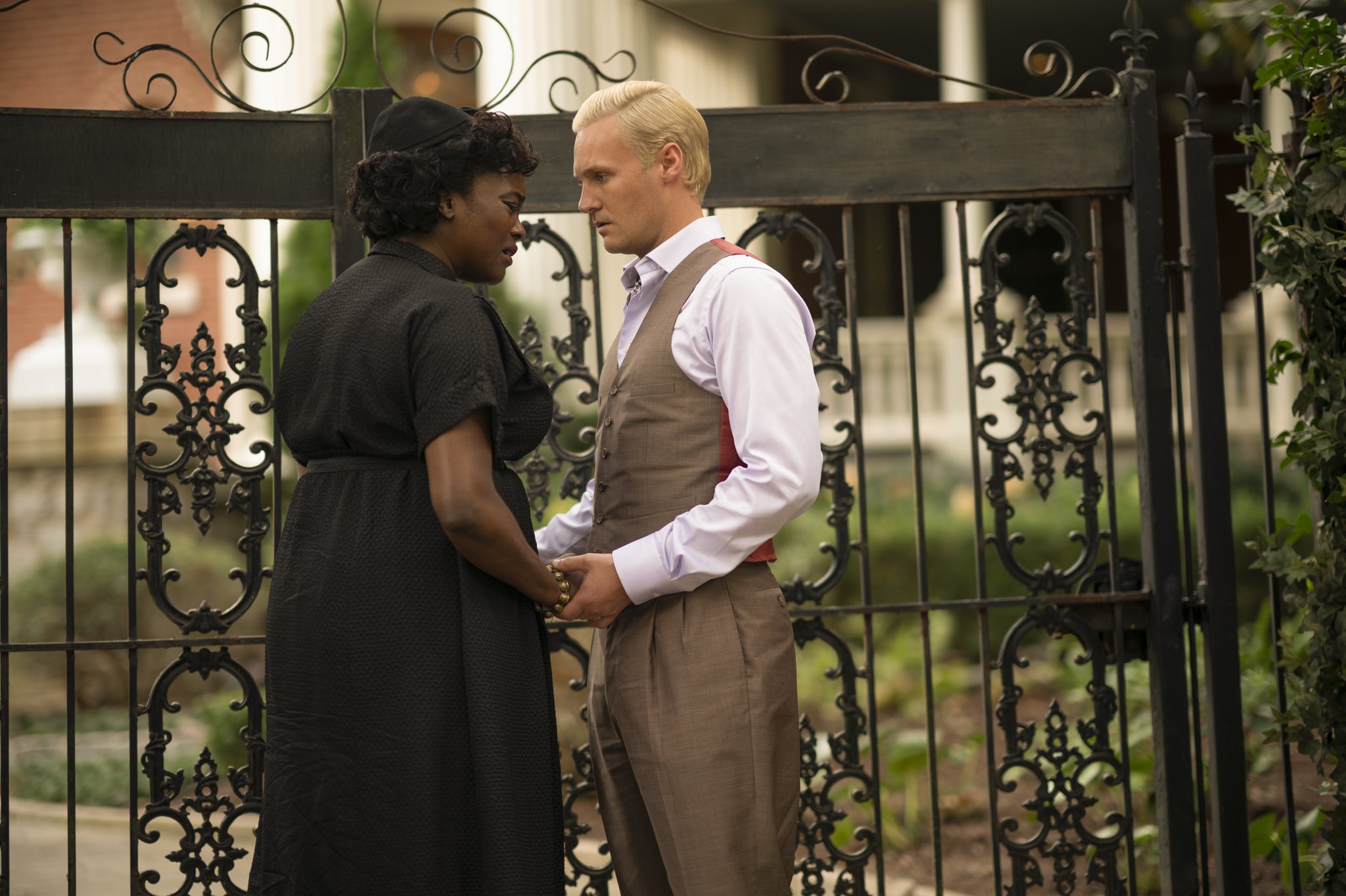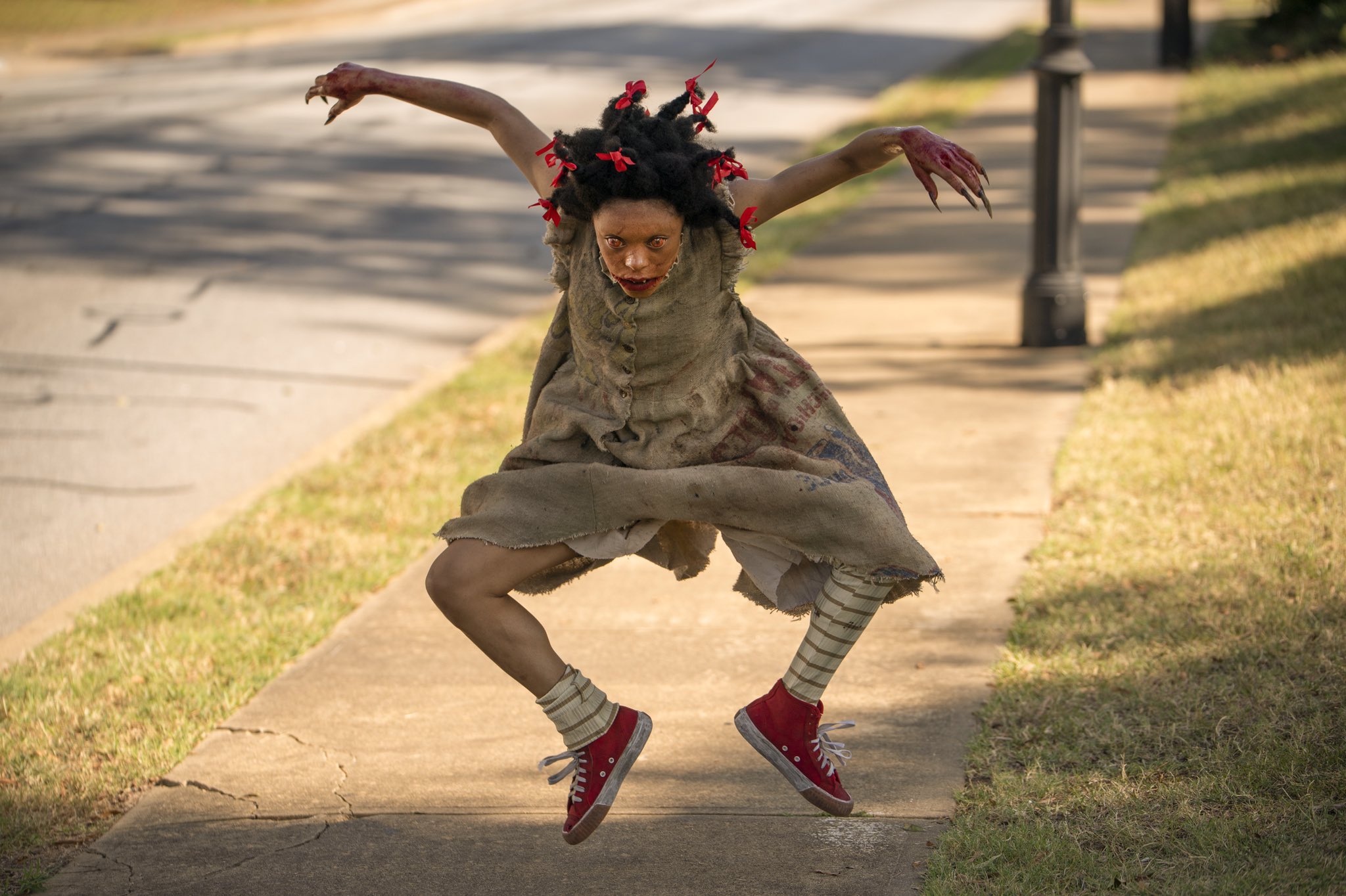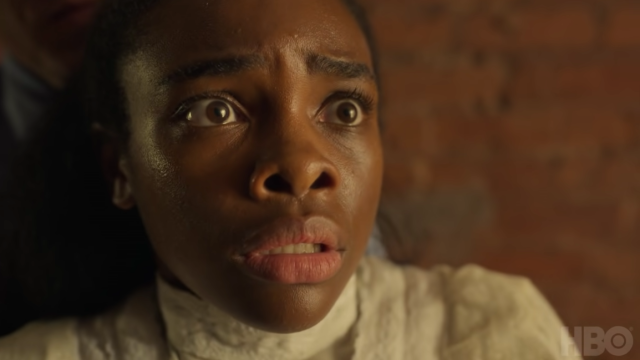With each episode of Lovecraft Country’s first season, a new family member or friend in Atticus Freeman’s midst has been unceremoniously dragged into a dark convergence of events that might result in a Lovecraftian apocalypse. By shifting its focus onto each member of its supporting cast, Lovecraft Country’s been able to make its fantastical world feel expansive and as if it’s populated with potentially countless stories of untold horror.
As “Jig-A-Bobo” — creator Misha Green’s directorial debut — finally gives Jada Harris’ Diana Freeman a chance to step into Lovecraft Country’s spotlight, the show does a surprisingly effective job of illustrating the parallels between its riffs on horror tropes and the sorts of real-world atrocities that so often terrorize Black Americans on a regular basis. Concerned as all of Lovecraft Country’s heroes are for Hippolyta, who disappeared without a trace and was spirited away to another planet, this week’s episode opens with the in-universe death of Emmett Till, a tragedy that rocks Chicago’s entire Southside, as the Black residents know that they live in a world that doesn’t truly want to see justice when racist white bigots kill Black people in cold blood.
[referenced id=”1514868″ url=”https://gizmodo.com.au/2020/09/lovecraft-country-has-given-up-cohesive-storytelling-in-favour-of-something-more-dramatic/” thumb=”https://gizmodo.com.au/wp-content/uploads/2020/09/29/ednjeu2dwlcgyi38dhqz-300×168.png” title=”Lovecraft Country Has Given Up Cohesive Storytelling in Favour of Something More Dramatic” excerpt=”What little hope there was for Lovecraft Country’s first season trying to tell a single, cohesive story went completely out the window this week with “I Am,” a statement episode that gave Aunjanue Ellis’ Hippolyta Freeman everything she’d ever dreamed of…just to ask her to give it all up.”]
“Jig-a-Bobo” (a play on the anti-Black racial slur and Till’s actual nickname “Bobo”) opens as Atticus, the rest of the Freeman family, and Leti take to the streets to march their way to a public viewing and funeral for Till, whose mother actually insisted that the service feature an open casket so that people could bear witness to the deadly brutality inflicted upon his body. Between the sweltering heat and the sheer gruesomeness of the boy’s corpse, a number of the people who come to pay their respects end up becoming physically ill in a way that reflects the level of tension and unease coursing through the city.
All of the adults in Diana’s life have their respective feelings about letting her see Till because he wasn’t just a neighbourhood kid to her — the two of them were friends. While Ruby and Montrose are both of the mind that it’s important for her to understand the evil that exists in the world, Atticus and Leti aren’t so certain. But Atticus’ mind is more focused on Leti who, like so many others in the crowd, ends up feeling more nauseous than she anticipated. Any time a character experiences nausea at the top of an episode after having just been in a sex scene in a previous episode, it’s safe to assume that said character might be pregnant. But before the story gets to Atticus and Leti’s future, the episode spends time digging into the reality of Diana’s trauma and how, in their unsureness of how to speak frankly with her about what happened to her mum and to Till, the people in her life only end up contributing to her pain.
Diana wandering off in a fit of mixed emotions and revulsion at what happened to her friend understandably sets off a panic in the family because they understand Chicago isn’t safe for a Black child given the police’s increased presence on the streets in response to Till’s viewing. Theirs is the fear that all Black family members feel for their children whenever they step out into the world unaccompanied and the potential danger should they cross paths with a racist with a grudge to pick. But to Diana’s surprise, the first people she meets while blowing off steam are actually two other Black girls who’re both seemingly unaware of and unconcerned with recent events.
The rage that Diana feels is visceral and heartbreaking and complicated. She’s mad at the two girls for being unbothered about her friend’s death, but in them she can see the carefreeness that she, too, should be able feel as a young person, but reality’s repeatedly robbed her of that freeness since Lovecraft Country’s begun. The raw anger she feels is the sort of near-everpresent trauma that Black people are forced to endure because the devaluation of Black lives is an American tradition that Black people themselves are made to bear witness to. Though what Diana feels is natural and relatable, the time she has to work through her emotions is cut short when, true to her family’s fears, she’s cornered and accosted by a pair of white police officers who chase her into an ally, demand about her mother’s whereabouts, and proceed to physically assault her.
As magical racist cops, the abuse they inflict on the young girl goes beyond merely beating her and making her legitimately fear for her life — one of the cops spits on Diana, placing a curse on her body that immediately prevents her from breathing. The scene’s ghastly enough on its own for the way it echoes Eric Garner being choked by police while audibly telling them he couldn’t breathe before ultimately dying, but it’s made that much more alarming by the massive advertisement for Cream of Wheat (featuring a smiling Black man) that grins down at the scene from a nearby wall.
While the police don’t kill Diana, she can immediately feel that they’ve done something strange to her, even though no one else in her family’s made a point of revealing the existence of magic to her or how spells work. It’s here that “Jig-a-Bobo” chooses to remind you that part of the reason the rest of the Freemans have been trying to keep Diana in the dark is that they’re dealing with a whole slew of their own problems like Ji-Ah suddenly showing up at Leti’s boarding house looking for Atticus and Atticus’ illicit, secret meetings with Christina where he demands that she teach him enough spellwork to be able to guard himself and his loved ones from supernatural dangers. By cluing Christina in to the fact that he knows she’s plotting something involving the golden orrery and the autumnal equinox, Atticus is able to convince her how to teach him how to draw a protective rune and explain that the intention is the true catalyst for making their brand of magic work.
[referenced id=”1494637″ url=”https://gizmodo.com.au/2020/09/lovecraft-country-expanded-its-mythos-with-a-carnal-story-about-war/” thumb=”https://gizmodo.com.au/wp-content/uploads/2020/09/22/lovecraft-country-300×167.png” title=”Lovecraft Country Expanded Its Mythos With a Carnal Story about War” excerpt=”The degree to which HBO’s Lovecraft Country has already branched off from the novel its based on might give you the sense that at this point, with half the season over, the story might slow down on the worldbuilding to begin fully weaving its core character’s arcs together in the…”]
As opaque as Christina’s intentions with the Freeman family as a whole are, her plans for Ruby are that much more difficult to discern as the episode contrasts Ruby’s pain over Till’s death with Christina’s seeming indifference. When Ruby arrives at Christina/William’s manor with a key to enter in hand, she’s stopped by another white man who first demands to know whether she’s the maid before making clear that he’s ready to hurt her out of his belief that she’s trespassing onto a white man’s property. It isn’t until Christina-as-William arrives to diffuse the situation and guide Ruby inside that things simmer down, but Ruby can’t ignore that it’s William’s privilege as a white man that protected her and not any sort of recognition of her humanity as a Black woman.
Rather than verbally addressing the emotional tension that exists in their now-established physical relationship, Ruby and Christina-as-William instead first choose to try and connect with one another in one of Lovecraft Country’s most disturbing sex scenes. After downing yet another vial of potion that transforms her into Hillary, Ruby-as-Hillary and Christina-as-William get down and dirty, and as Ruby orgasms, the transformation process begins to reverse much more quickly than we’ve seen before, all the while the pair passionately cling to one another, bathed in Hillary’s sloughed off flesh and spilled blood. In the aftermath of their encounter, Ruby (back in her her own skin) is able to put to words what she’s been feeling — that she was ashamed at the idea of being a Black woman having sex with a white man, and that she needed to know whether Christina felt any sorrow for Till. Christina is frank with her: she doesn’t care about Emmett Till or the plight of anyone but herself, really, and Christina firmly believes that Ruby’s feels the same, only she’s too ashamed to admit it.

Ruby’s brief flashes of hostility towards her Black colleague at Marshall Field while she was wearing Hillary’s skin suggested that, to some degree, she was beginning to become comfortable in her faux whiteness to a degree that made it possible for her to externalize years of self-loathing onto other Black women. It’s an ugly concept to mull over that hits the character hard because, much as she might not own up to it, she has been sneaking up to be with Christina knowing full well that the sorceress is up to absolutely no good in Chicago.
Because “Jig-a Bobo” is truly Diana’s episode, it’s at its strongest when she’s the focus, especially as she finally comes to understand how the cops’ curse on her manifests itself. In Matt Ruff’s novel, Horace — Diana’s male counterpart — finds that he’s being stalked by a number of inanimate objects, like a racist lawn jockey and what’s meant to be a witch doctor-like doll that suddenly comes to life in moments when he’s alone. Here, things go one step further when Diana begins seeing a pair of twin girls — the same two she saw laughing earlier in the episode — transformed into apparitions styled after Topsy, a character briefly mentioned in Uncle Tom’s Cabin who’s most often illustrated as a disheveled caricature of an enslaved child.
The two girls — Topsy (Kaelynn Gobert-Harris) and Bopsy (Biance Brewton) — are as demonic in their appearance as they are offensive because of the ideas they evoke, but from Diana’s perspective, they’re beings to fear. Not only the pair haltingly-dance like some sort of otherworldly monsters, but no one else can see them, and whenever they get too close to Diana, she again loses her ability to take in oxygen. The way that Topsy and Bopsy follow her around Chicago as she desperately tries to explain what’s happening to her is frankly one of the most unnerving scares Lovecraft Country’s managed to pull off so far if only because there’s something uniquely stomach-churning about not being able to make other people understand one’s fear. Even after Diana works up the courage to confront the cops who cursed her and face the demons head-on, figuring that she can will them both away, the story makes clear that Diana’s in need of protection that she can’t provide herself.

The strangest bits of “Jig-a-Bobo,” though, end up crashing into the Freemans as Atticus and his father have a heart-to-heart about their family history and Atticus explains to Montrose that when he and Hippolyta were sucked into the magical portal last episode, “I Am,” Atticus actually ended up in the future. This bit of information would have landed far more significantly had the previous episode actually shown any of that, but instead, Atticus whips out a copy of a book called Lovecraft Country he insists was written by his as-of-yet unborn son, George. The series’ in-universe novel more or less cleaves to the details of Ruff’s novel as a bit of meta-world building that, if we’re being honest, doesn’t do the television series many favours. Even now, Lovecraft Country’s struggling to thread a needle that the novel was so deftly able to in a more straightforward way.
Even more distressing is the way the episode ends with Leti’s home almost being besieged by cops who, finding that it’s under magical protection, instead decide to open fire as Atticus arrives on the scene. Thanks to a protective charm Christina placed on Leti, she ends up being quite impervious to bullets, much to Ruby’s surprise, and for the briefest of moments, Leti resolves to use herself as a shield to protect the person she loves most, who in this case is the father of her unborn child (something Atticus independently worked out on his own). The last few shots of “Jig-a-Bobo” slow down to draw your attention to Atticus standing in the middle of the street with his hands held high in front of an entire squad’s worth of white police officers who are ready to shoot him in cold blood. Again, Lovecraft Country is trying to impress upon you how much a part of American history scenes like these are, but it pivots left as one officer fires a shot, only for one of the shoggoth to emerge from the ground and begin eviscerating the cops.
Whether it’s the spell of protection that Christina kind of taught him or some deeper magic that summons the beast to protect the Freemans is unclear, but in the final moments you can see that the war being fought isn’t just between the Freemans and their white supremacist enemies. The family’s caught in the middle of a turf war that’s far more complex than any of them fully realise, and with only two episodes of Lovecraft Country left after this, it very strongly seems as if things are only going to get more dangerous for everyone involved.
